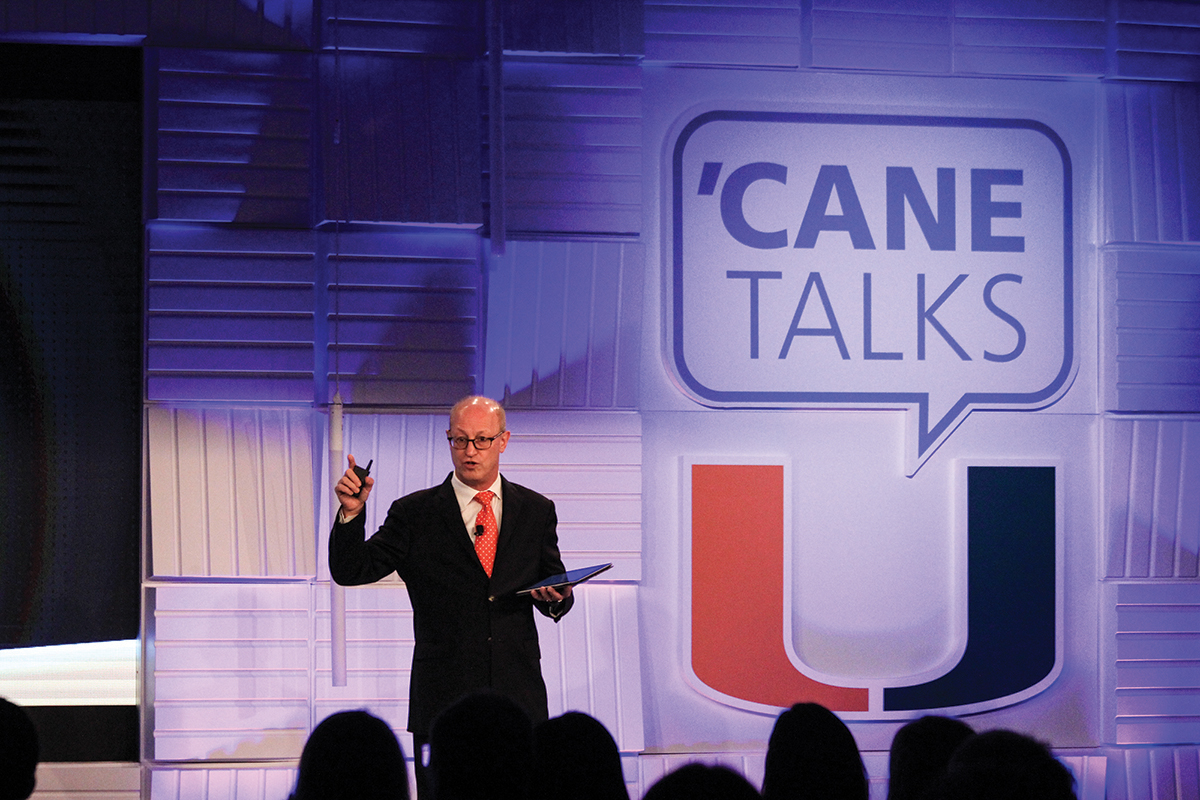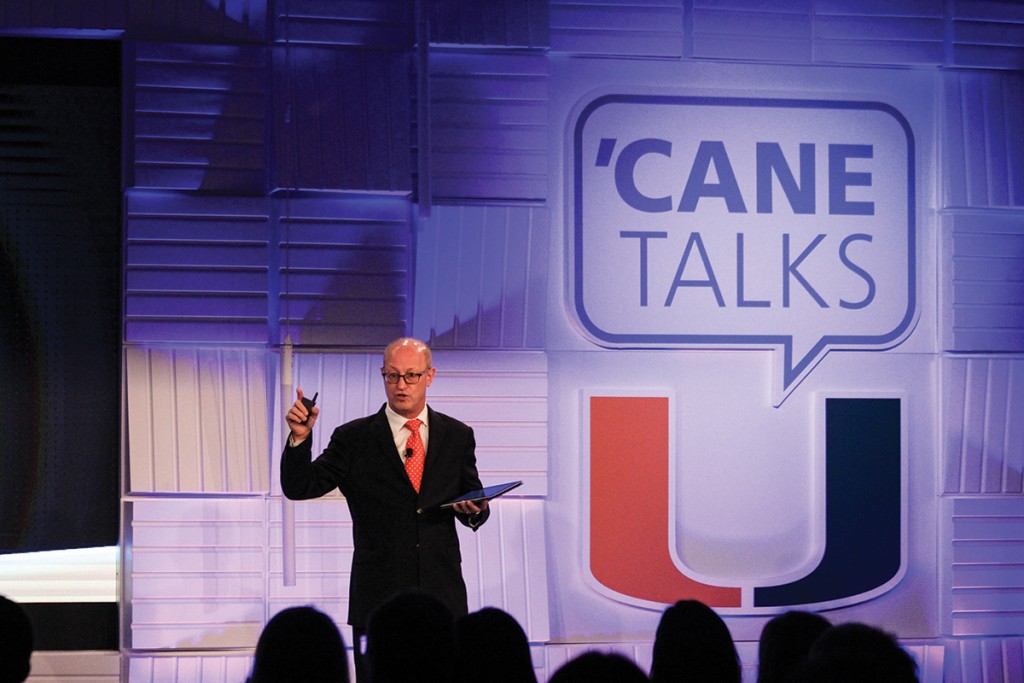

Four hours before Dr. Julio Frenk’s inauguration as the sixth president of the University of Miami, professors, administrators, students and alumni who were characterized by the school as leading thinkers in the community explored the global challenges of the next century. They offered insight into ideas of their respective fields that will help to address these challenges.
Held on the third floor of the Donna E. Shalala Student Center, the building named in honor of Frenk’s predecessor, the first ever ‘Cane Talks featured speakers sharing social, ecological, technological, creative, biological and political ideas. The East and West Ballrooms hosted 10 speakers in total.
To kick off the talks, Frost School of Music Dean Shelton “Shelly” Berg described the new curriculum in the music school. It is designed to train musicians for a career world where “pools” of opportunity, like major orchestras or bands, are disappearing, being replaced instead by small “puddles” of highly personalized jobs. The curriculum, called Experiential Music Curriculum (EMC) offers students the usual large lecture-hall style lessons, but also forms small groups of four or five musicians in what Berg called “skills ensembles.” In these ensembles, musicians put concepts into practice.
“It takes a village to nurture the deep and broad skills that we know our students will need to go through life with,” he said.
Kenny Broad, a professor at the Rosenstiel School of Marine and Atmospheric Science (RSMAS) and the 2011 National Geographic Explorer of the Year, explained how caves could be beneficial for the future by holding resources that can help the climate and how they are an indication of the environment.
“One of the big surprising finds we found is Saharan dust,” Broad said. “We find [dust] in such high quantities and correlated in time with abrupt climate changes in the stalagmites that it is causing us to rethink the sensitivity of the climate and what are the main drivers of climate change.”
Next was Amishi Jha, neuroscientist and associate psychology professor, who has worked with the military counseling soldiers on how to protect themselves psychologically by using mindfulness training exercises. She explained how mindfulness, the ability to be fully aware of your thoughts in the moment, increased the user’s capacity to pay attention and to protect their brain from stress.
Jha explained research she completed on soldiers going through high-intensity training. She provided mindfulness training to one group over a two-month interval while leaving the other group to its natural habits.
“The one that did not receive mindfulness training saw their attention get worse,” Jha said. “While the group that [was] provided mindfulness saw their attention stay stable … and those who really committed [to engaging] mindfulness saw their attention levels soar.”
The soldiers who participated in the course were appreciative of the training.
“During my previous deployment, I would be so jittery, fragmented and ready to pull the trigger,” a marine medic’s testimonial read. “But this time I was focused, more attentive, while before it was just a blur.”
Although her research was conducted on soldiers going to an intense, high-stress area, she knows mindfulness training can still be applicable to other kinds of stress like students facing heavy academic loads.
“Most of us in this room are not headed into a war zone,” Jha said. “But I would argue that there have been many times that we experienced high-stress intervals and in those moments, the consequence could feel like life and death. Through my own work, we can do something about it, engage in mindfulness training and make our minds stronger.”
Critically acclaimed playwright and Theater Arts and Civic Engagement Professor Tarell Alvin McCraney spoke to the audience of the different “stories” each city holds. He described the art scene in Miami as a unique strain of theatre because of its infusion of multiculturalism. However, McCraney emphasized, there is still a lack of diverse representation in theater because artists of color are not being given the chance to receive proper training.
To attempt to mitigate the problem, he began a theater arts program that takes young women in high school and offers them an artistic leadership program.
“Our aim is to train young, civically engaged artists who will be the future cultural leaders of Miami. We are asking them to tell us what the distant present looks like,” McCraney said.
One of the most renowned researchers of HIV/AIDS, Dr. Margaret Fischl of the Miller School of Medicine was one of the first investigators to pinpoint the heterosexual transmission of HIV. She was also part of a team that led to the approval of the first drug for the treatment of HIV in 1986.
Fischl talked about groundbreaking treatments for HIV and the dramatic reduction in the number of HIV-related deaths after the introduction of drug treatments. She also displayed statistics showing that there is still work to be done.
“We still have more than 1.2 million people living with HIV in the United States today,” Fischl said. “More than 150,000 do not know that they have HIV infection and we still see 50,000 new cases per month.”
Dean of the School of Architecture Rodolphe Al-Khoury showed visuals of a number of projects the school has worked on that incorporate technological innovation and design to come up with creative solutions to problems. One such example was a coffee mug with an IP address that syncs social media updates to an interactive coffee bar.
The Knight Chair in visual journalism of the School of Communication, Alberto Cairo talked about how data can be visually presented as a powerful tool to derive meaning from something that may have an enormous amount of data.
“Data visualization can confirm or refute our assumptions when we see it,” Cairo said.
The lone student to speak in the event was Mateus Lima, a junior majoring in economics and biology. Lima spoke about his time in the university and what it was like transitioning to the United States from Brazil.
Lawyer and professor Osamudia James packed a powerful 10 minutes with a range of race-related issues, such as the unintentional “segregation” in education, the imbalance of resources in black communities and the dangers of using the superficial language of “diversity.”
“Vigorous classroom exchange is important and students of color can certainly bring alternate perspectives to white classrooms,” James said. “But admitting students of color to diversify an institution and make the intellectual environment more stimulating for whites should not be the primary reason we think about race in admissions.”
Alumna Neri Karra shared her story of emigrating from Turkey to Miami to get the education she considered her “way out” of struggle. Karra studied business at UM and went on to start her own family business manufacturing leather goods and fashion accessories. Her business is now headquartered in London and has branches in 14 countries around the world.
She pointed out the importance of believing in oneself and then returning those lessons to others in need.
“It was possible for me to do whatever I’ve done because at some point, someone was a blessing to me,” Karra said.





